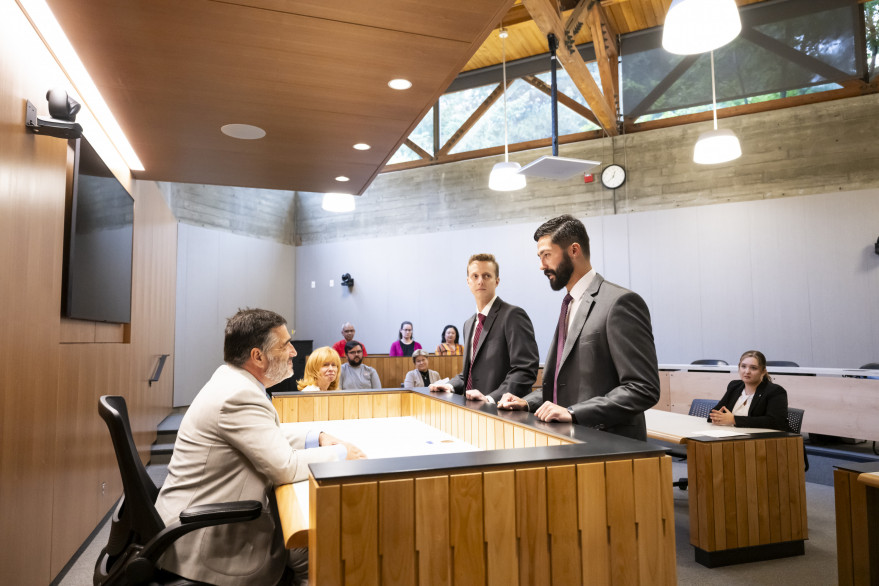Competition Teams
At Lewis & Clark Law, the moot court and mock trial competition teams offer hands-on training in legal advocacy, simulating real-world courtroom scenarios.
Moot court competitions focus on appellate advocacy, where students research legal issues, write briefs, and present oral arguments before judges. Mock trial competitions involve simulating a trial, where students take on roles as attorneys and witnesses to argue a case before a judge and jury.
These experiences provide invaluable practical skills in legal research, writing, and courtroom presentation, preparing students for success in their future legal careers.
Competitions
Moot Court: ABA Negotiation National (713)
This competition, offered by the ABA Law Student Division, focuses on honing law students’ negotiation skills through simulated legal negotiations. Participants act as lawyers to negotiate legal problems with both common and confidential information. This course emphasizes developing practical negotiating abilities within a legal context, with each round presenting a new negotiation scenario related to a consistent general topic.
- ABA Negotiation National (713)
Moot Court: ABA Client Counseling Regional (724 A)
Designed to refine students’ interviewing, counseling, and communication skills essential for legal practice, this Moot Court competition emphasizes client interaction techniques. The course features an intra-school competition at the end of the Fall semester, providing students with hands-on experience in client counseling within a competitive setting.
- Moot Court: Client Counseling Regional (724A)
Moot Court: Jessup Regional / International (726)
Students begin with intensive research and memo writing on a significant question of international law during the fall semester, culminating in selection for regional competition teams. This preparation phase includes writing detailed briefs and engaging in oral argument practices, leading to participation in the U.S. Regional Rounds of the Jessup Competition. Success at the regional level opens the door to the international rounds in Washington, D.C., offering a global platform for legal advocacy.
This competition is a gateway to the Philip C. Jessup International Law Moot Court Competition, the largest moot court event globally. Participants delve into significant international law questions through research, memo writing, and oral arguments. After an initial in-school moot, selected students form regional teams, further refining their advocacy skills through brief writing and oral argument practice in preparation for the regional rounds.
Moot Court: Energy Law National (720)
Hosted by the WVU College of Law Moot Court Board, this competition is tailored for students interested in Energy and Sustainable Development law. It offers participants a platform to engage with pressing issues in the energy sector, fostering a deep understanding and expertise in this rapidly evolving field.
- Moot Court: Energy Law National (720)
Moot Court: Pace Environmental Advocacy National (719)
The Jeffrey G. Miller National Environmental Law Moot Court Competition (NELMCC) at Pace University, established in 1989, stands as one of the largest national moot court competitions. It focuses on environmental law and advocacy, challenging students to argue complex legal issues before panels of attorneys and judges. The competition has historically brought together hundreds of law students and legal professionals, promoting a rigorous examination of environmental legal principles.
- Moot Court: Environmental Advocacy National (719)
Moot Court: Mock Trial (728/729)
This course, led by experienced legal practitioners, offers comprehensive training in trial advocacy. Covering all trial phases, from pre-trial preparation to closing arguments, students engage in practical exercises and simulations. The course culminates in a mock trial competition, providing a real-world courtroom experience and the opportunity for outstanding individuals to represent the school in regional competitions.
- Moot Court: Mock Trial (728)
Moot Court: NALSA (736/737)
Focusing on Native American law, students work collaboratively on a problem-solving brief and engage in oral advocacy practices. This preparatory work leads to representing the school at the national competition in the spring, promoting an in-depth understanding of and advocacy for Native American legal issues.
In collaboration with the University of Montana Alexander Blewett III School of Law, this competition focuses on Native American law, offering students a chance to explore and advocate on indigenous legal issues.
- Moot Court: NALSA National (737)
American Bar Association Taxation Section’s Law Student Tax Challenge:
Students are invited to participate in a national tax planning and client-counseling competition designed to more closely reflect everyday tax practice than traditional moot court competitions. Participants work in teams of two to produce a memorandum and client correspondence on the tax consequences of a complex business-planning problem. The competition provides students with the opportunity to research “real-life” tax planning issues and to demonstrate their acquired tax knowledge through their writing skills.
If a Lewis & Clark team is chosen as a semifinalist, members of the team compete at a national event, where they orally defend their written work before a panel of nationally known tax experts. In 2006, the law school’s first team in the competition did so, and it won the national prize for the best-written submission. Lewis & Clark has excelled in national tax moot court programs since its earliest entries in the 1990s. In two consecutive years, Lewis & Clark was the only law school to take home honors in both the written and oral portions of the National Tax Moot Court Competition sponsored by the Florida bar.

Student Affairs is located in Legal Research Center (LRC) on the Law Campus.
MSC: 51
email lclawsa@lclark.edu
fax 503-768-6671
Associate Dean of Student Affairs
Libby Davis
Associate Director of Student Affairs
Alyssa Salstrom
Director of Academic Excellence and Inclusion
Alexandra Cook
Student Affairs
Lewis & Clark Law School
10101 S. Terwilliger Boulevard MSC 51
Portland OR 97219